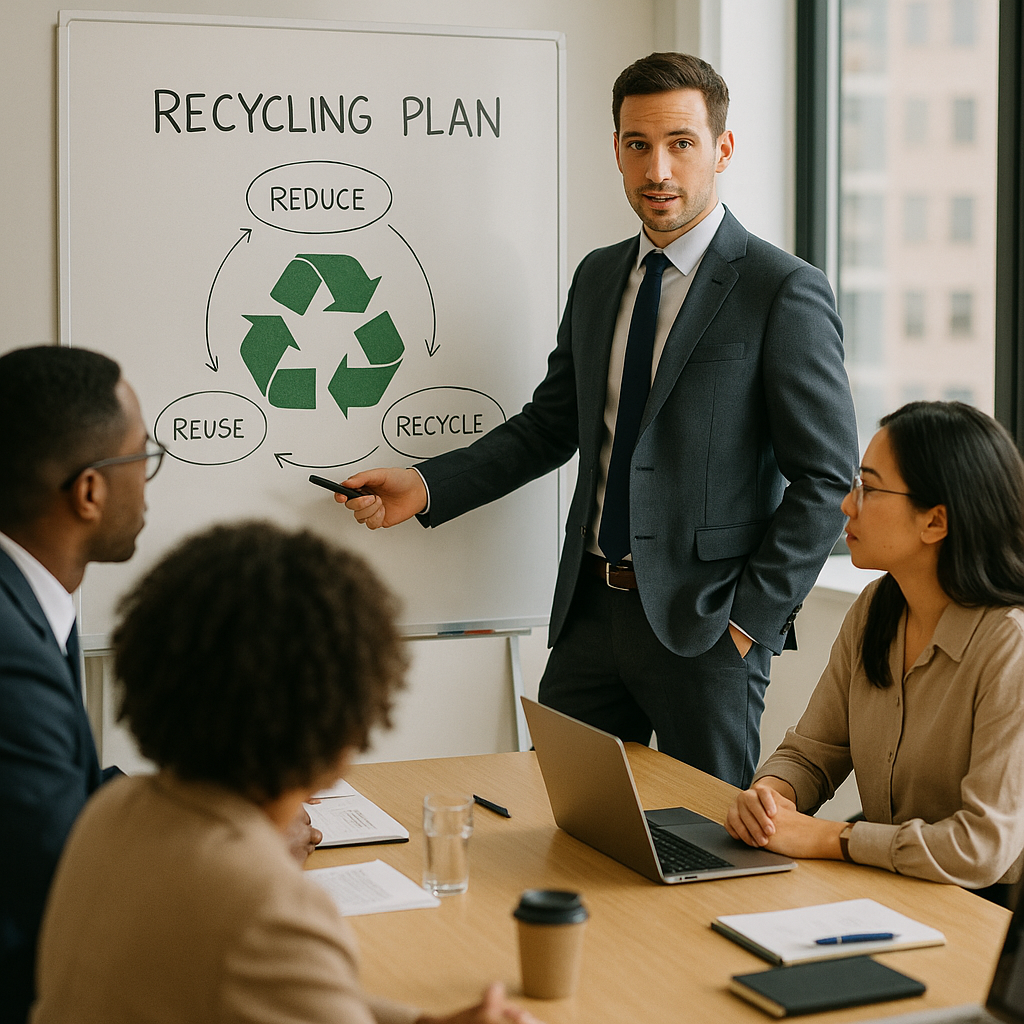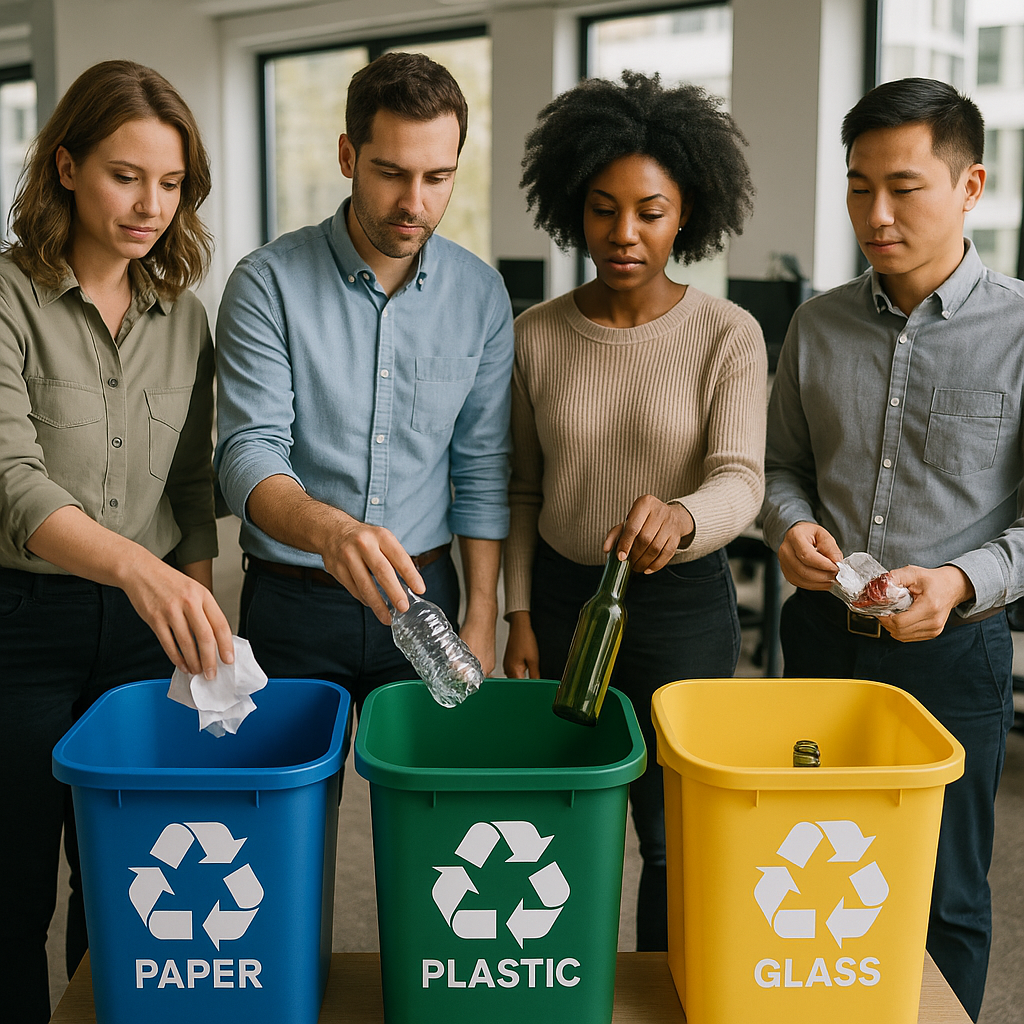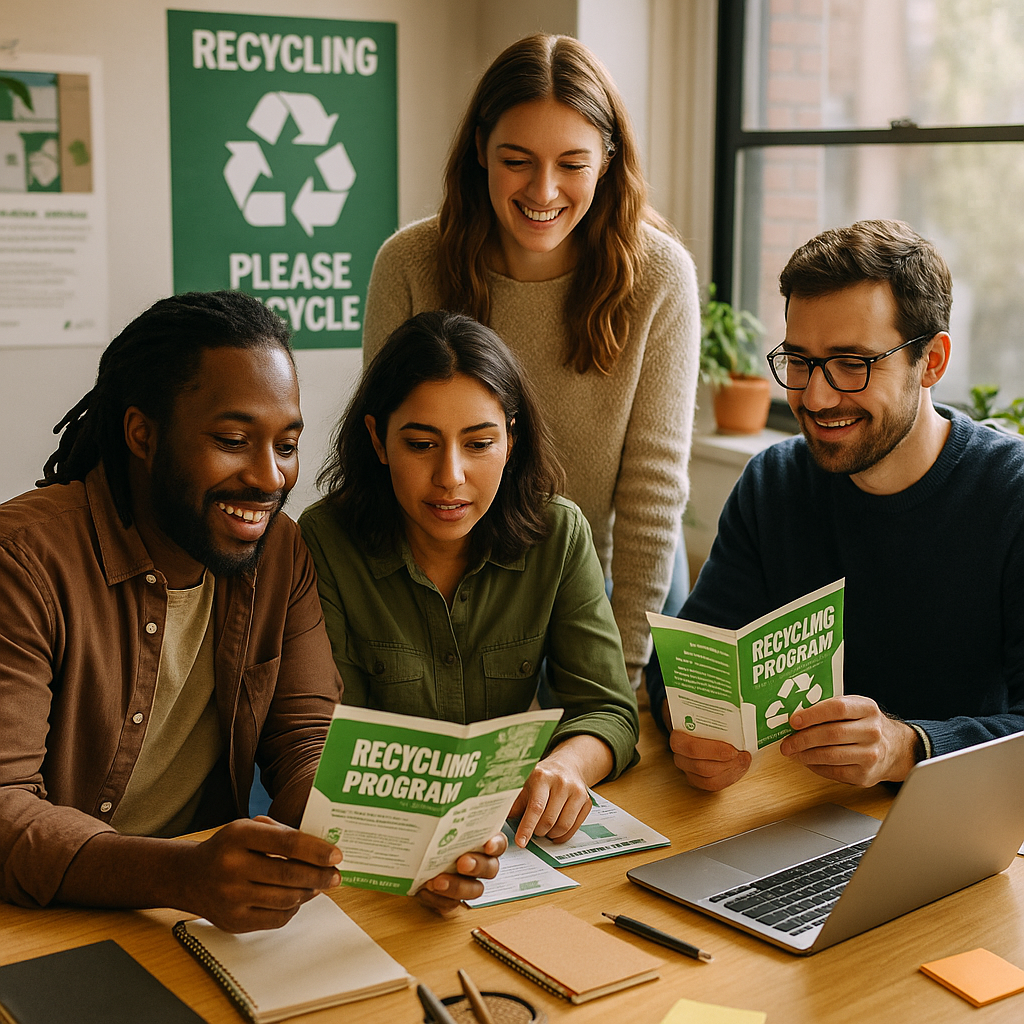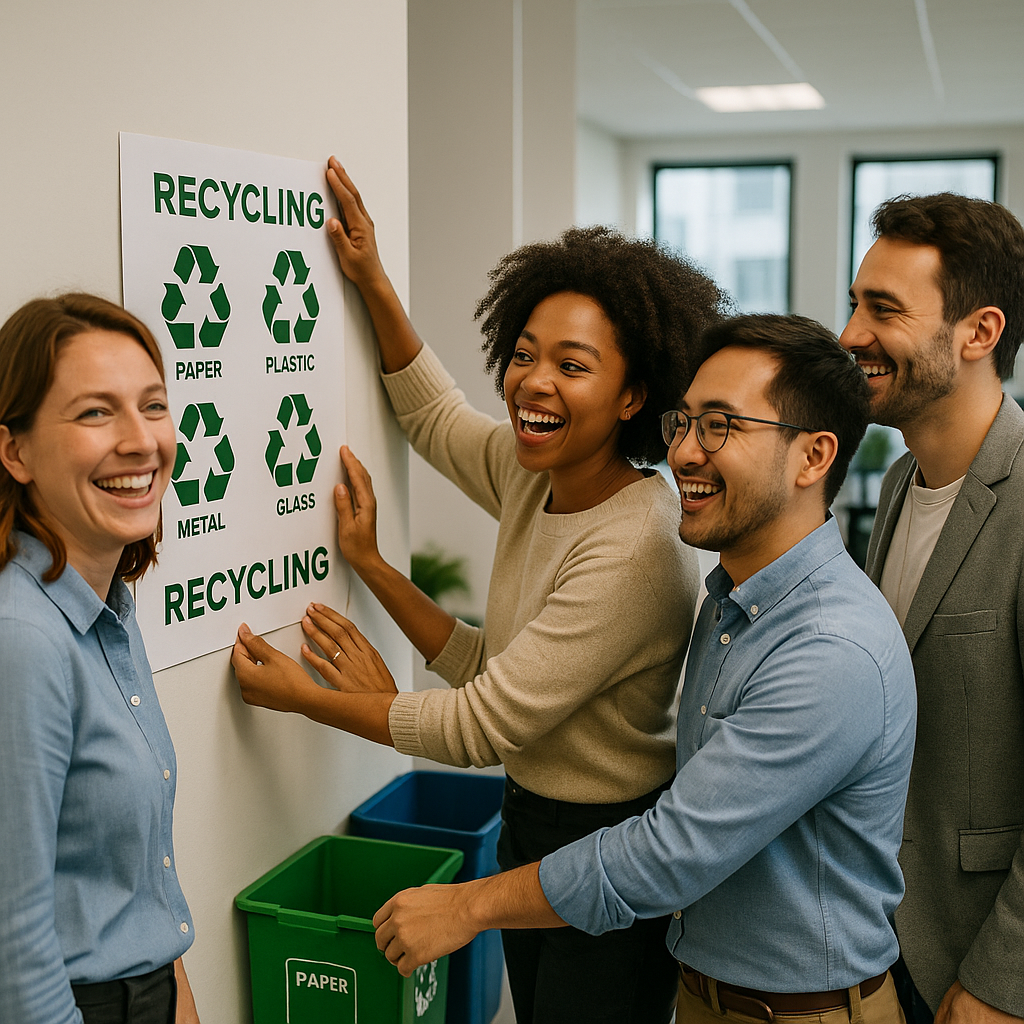5901 Botham Jean Blvd, Dallas, TX 75215
Corporate Recycling Guidelines: Essential for Business
August 13, 2025More than half of companies today identify climate change as a major sustainability concern. This growing awareness has elevated corporate recycling from a nice-to-have program to an essential business practice. Corporate recycling guidelines provide the framework businesses need to minimize waste, comply with regulations, and demonstrate genuine environmental stewardship.
Effective recycling guidelines go beyond directing where to place paper and plastic. They establish clear protocols that align with company values, engage employees across departments, and create measurable environmental impacts. When implemented correctly, these guidelines help organizations reduce operational costs while supporting broader sustainability goals.
The business case for strong recycling guidelines is becoming increasingly compelling. As stakeholders increasingly evaluate companies based on environmental performance, organizations that implement comprehensive waste management programs gain competitive advantages. Forward-thinking businesses recognize that recycling initiatives offer both environmental benefits and practical business value through improved resource efficiency and reduced disposal costs.
How Can Businesses Assess Their Current Waste Management?

A business manager engages the team by presenting a recycling plan, fostering collaboration in a bright office environment.
A waste audit is essential for effective recycling and waste reduction strategies. This systematic evaluation helps businesses understand what they are discarding, the associated costs, and opportunities for diverting materials from landfills.
Before investing in new recycling programs or equipment, understanding your current waste composition is crucial. A thorough assessment provides the baseline data needed to make informed decisions and measure future improvements.
Planning Your Waste Audit
Start by defining clear objectives for your audit. Are you aiming to reduce disposal costs, increase recycling rates, or comply with regulations? Your goals will shape the scope and depth of your assessment.
Assemble a diverse team from different departments to ensure comprehensive insights. Include representatives from facilities management, operations, and sustainability roles if available. This cross-functional approach provides multiple perspectives on how waste is generated throughout your organization.
Conducting a Basic Visual Assessment
For businesses new to waste auditing, a simple visual assessment offers valuable insights without extensive resources:
- Examine waste bin contents throughout your facility at the end of a typical business day
- Photograph contents for documentation and later analysis
- Estimate the percentage of recyclable materials currently being landfilled
- Note contamination in recycling bins, such as food waste mixed with paper
- Review disposal invoices to understand current waste management costs
Pay particular attention to bin placement. Are recycling bins conveniently located near where recyclable waste is generated? Clear signage and strategic bin placement can dramatically improve recycling rates.
Measuring Waste Volume and Composition
For a more precise assessment, separate and weigh different waste categories. This quantitative approach provides concrete data for decision-making and establishing measurable goals.
A simple calculation illustrates potential impact: If your 30-gallon office trash containers are collected daily and typically 80% full, and visual inspection shows approximately 40% is recyclable paper, you can calculate:
30 gallons × 0.8 (fill rate) × 0.4 (recyclable portion) × 5 days × 52 weeks = 2,496 gallons of recyclable paper potentially diverted annually per container.
Analyzing Disposal Methods
Evaluate your current waste removal services and contracts. Are you paying for frequent pickups of half-empty dumpsters? Could compactors reduce hauling costs? Document how different materials are handled, from collection to disposal.
Many businesses find they are overpaying for waste removal while missing opportunities to receive rebates for certain recyclable materials. Check whether your service provider offers revenue-sharing options for valuable recyclables like cardboard, metals, or electronics.
Identifying Improvement Opportunities
After gathering data, look for patterns that reveal opportunities for immediate improvement:
- High volumes of specific recyclable materials currently being landfilled
- Operational practices generating excessive waste
- Areas with inadequate recycling infrastructure
- Employee knowledge gaps about proper waste sorting
Common findings include excessive cardboard in general waste, overuse of single-use items, and confusion about which plastics are recyclable in your area.
Developing Action Plans
Use your audit findings to create targeted waste reduction strategies. Prioritize actions based on potential impact and ease of implementation. Simple changes often yield significant results – such as adding clearly labeled recycling stations in high-waste areas or improving employee education about proper sorting.
Document your baseline findings thoroughly so you can measure progress over time. Regular follow-up assessments help track improvements and identify new opportunities as your waste reduction program matures.
What Are Key Components of Effective Corporate Recycling Programs?

Creating an effective corporate recycling program requires strategic planning and organizational commitment. Successful programs share key elements that drive participation and maximize waste diversion. Properly implementing these components creates a framework for sustainable waste management that benefits both the company and the environment.
Establishing a dedicated green team is essential to spearhead recycling initiatives. This cross-departmental group should include enthusiastic representatives from various areas of the organization who can champion the program. Green teams are responsible for planning, implementing, and monitoring recycling efforts, ensuring accountability and consistent progress toward sustainability goals.
Setting clear, measurable recycling goals provides direction and motivation. Start by conducting a waste audit to understand your current waste stream and establish a baseline. This allows you to identify common recyclable materials in your facility and set realistic targets for waste reduction and recycling rates. Specific goals such as “increase recycling rate by 15% within six months” or “achieve 50% waste diversion by year-end” create focus and enable meaningful progress tracking.
Strategic bin placement with proper signage significantly impacts participation rates. Recycling bins should be placed in high-traffic areas and always paired with trash receptacles to prevent contamination. Color-coded bins with clear, image-based signage help employees quickly identify where to dispose of different materials. This visual system transcends language barriers and reduces confusion.
Centralized recycling stations in common areas are often more effective than individual desk-side bins. These collection points create visibility for the recycling program while allowing for better quality control of materials. Some companies find success with a hub-and-spoke model, where smaller collection points feed into centralized sorting stations before materials are transported to loading areas.
Comprehensive employee education is a critical component of successful recycling programs. Regular training sessions, clear communication about acceptable materials, and ongoing feedback about program performance keep recycling top-of-mind. Educational materials should explain not just what to recycle, but why it matters, connecting individual actions to broader environmental benefits.
Partnerships with reliable waste management services ensure that collected materials are recycled. When selecting a recycling vendor, look for companies that provide transparent reporting on material processing and can handle the specific waste streams generated by your business. Many service providers can also assist with program design, bin procurement, and employee education.
Monitoring and evaluating program effectiveness allows for continuous improvement. Track key metrics like recycling rates, contamination levels, and cost savings. Regular waste audits help identify opportunities to expand the program or address problem areas. Sharing these results with employees reinforces the importance of their participation and demonstrates the company’s commitment to environmental responsibility.
Program sustainability requires ongoing communication and reinforcement. Use internal newsletters, signage, and company meetings to celebrate successes, provide updates, and maintain enthusiasm. Recognition programs that reward departments or individuals for outstanding recycling efforts can boost participation.
By implementing these key components, companies can build recycling programs that effectively divert waste from landfills while fostering a culture of environmental stewardship. The most successful programs evolve over time, adapting to changing waste streams and incorporating employee feedback to maximize effectiveness.
| Metric | Description | Calculation/Formulas |
|---|---|---|
| Recycling Rate | Measures the percentage of total waste that is recycled. | (Weight of Recycled Waste / Total Waste Generated) x 100 |
| Waste Diversion Rate | Indicates the percentage of waste diverted from landfills through recycling, composting, or reuse. | (Total Diverted Waste / Total Waste Generated) x 100 |
| Contamination Level | Assesses the level of non-recyclable materials present in recycling streams. | Measured via waste audits or evaluations |
| Cost Savings | Financial benefits gained by reducing waste disposal costs and increasing recycling efficiency. | Sum of reduced waste disposal costs and revenue from recyclables |
| Employee Engagement | Evaluates participation and education levels of employees in recycling efforts. | Measures surveys, training participation rates |
What Resources Are Available to Support Corporate Recycling Initiatives?

Businesses looking to improve their recycling programs can access a wide range of support resources. Many organizations are unaware of the assistance available, from financial aid to expert guidance. These resources can substantially reduce implementation costs while enhancing the effectiveness of corporate recycling initiatives.
Financial Assistance Through Grants
Various government agencies and nonprofit organizations offer grants to help businesses offset the costs of launching or enhancing recycling programs. These financial aids can turn what might seem like a costly initiative into a viable investment.
Many local governments provide funding specifically for recycling infrastructure. For instance, Hennepin County in Minnesota offers businesses up to $3,000 in containers and compostable bags to start or improve recycling and organics collection. Similar programs exist across North America, with funding amounts varying by location and project scope.
Grant opportunities typically include:
- Container and equipment grants for recycling bins and sorting stations
- Matching funds where organizations contribute a percentage alongside the grant
- Waste prevention grants focusing on reducing waste at the source
- Infrastructure grants for larger recycling system implementations
Free Educational Materials and Signage
Clear communication is crucial for successful recycling programs. Many municipal waste departments offer free standardized signage to ensure proper sorting. These materials often use color-coding (blue for recycling, green for organics, black or red for trash) and include visual guides showing what items belong in each bin.
Available educational resources include:
- Color-coded bin labels with images of acceptable materials
- Posters explaining recycling procedures for common areas
- Digital content for company intranets or email distribution
- Training materials for staff education sessions
These resources eliminate the need for custom materials, ensuring signage follows best practices for effective waste sorting.
Technical Assistance and Consultation
Many waste management authorities offer free on-site assessments and program development assistance. These services connect businesses with recycling experts who can evaluate current waste streams, recommend improvements, and help implement effective systems.
Technical assistance typically includes:
- Waste audits to identify recycling opportunities
- Recommendations for bin placement and collection systems
- Staff training on proper recycling procedures
- Guidance on working with waste haulers
- Ongoing support to address challenges as they arise
For specialized industries with unique waste streams, organizations like the Minnesota Technical Assistance Program (MnTAP) provide sector-specific expertise to identify waste reduction opportunities and compliance solutions.
Online Directories and Resource Finders
Finding appropriate recycling services for specific materials can be challenging. Online directories connect businesses with local recycling options for materials ranging from standard recyclables to specialized items.
Useful resources include:
- The Recycling Partnership’s Community Recycling Program Tool
- Earth911’s recycling location finder
- Industry-specific material exchange programs
- Local waste management authority websites
These directories help businesses locate appropriate recycling solutions for various waste streams, ensuring materials are properly managed.
Partnerships and Recognition Programs
Several organizations offer partnership programs that provide ongoing support while recognizing businesses for their sustainability efforts. Programs like MNimize help food businesses reduce single-use plastic waste through site assessments, technical assistance, and public recognition for achievements.
Partnership benefits include:
- Regular support from sustainability experts
- Networking with other environmentally conscious businesses
- Public recognition that enhances brand reputation
- Access to exclusive resources and funding opportunities
For businesses aiming to demonstrate their commitment to sustainability, these programs offer a framework for continuous improvement and external validation of their efforts.
| Resource Category | Resources Available |
| Financial Assistance | Grants for infrastructure, matching funds, and waste prevention projects |
| Educational Materials | Standardized signage, posters, digital content, training materials |
| Technical Assistance | Waste audits, bin placement guidance, staff training, ongoing support |
| Online Directories | Recycling location finders, material exchange programs |
| Partnerships | Sustainability programs offering support, recognition, and resources |
Utilizing these resources can significantly reduce the cost and complexity of implementing effective recycling programs. By leveraging available assistance, businesses can develop sustainable waste management practices that benefit both their operations and the environment.
Conclusion: Implementing Successful Corporate Recycling Guidelines

Implementing effective corporate recycling guidelines requires a strategic approach that addresses all aspects of waste management within an organization. Throughout this guide, we have explored how businesses can develop comprehensive recycling programs that not only reduce environmental impact but also create operational efficiencies and strengthen corporate responsibility initiatives.
The key to success lies in a methodical approach including waste assessment, program development, employee engagement, and continuous evaluation. By understanding your waste stream, setting up proper collection systems, and educating staff, your business can significantly increase recycling rates while reducing landfill waste. Effective recycling programs are not static—they require ongoing attention, regular updates, and consistent communication to maintain momentum and adapt to changing needs.
Ready to transform your organization’s environmental impact through improved recycling practices? Contact Okon Recycling at 214-717-4083 for expert guidance in developing and implementing corporate recycling guidelines tailored to your business needs.
